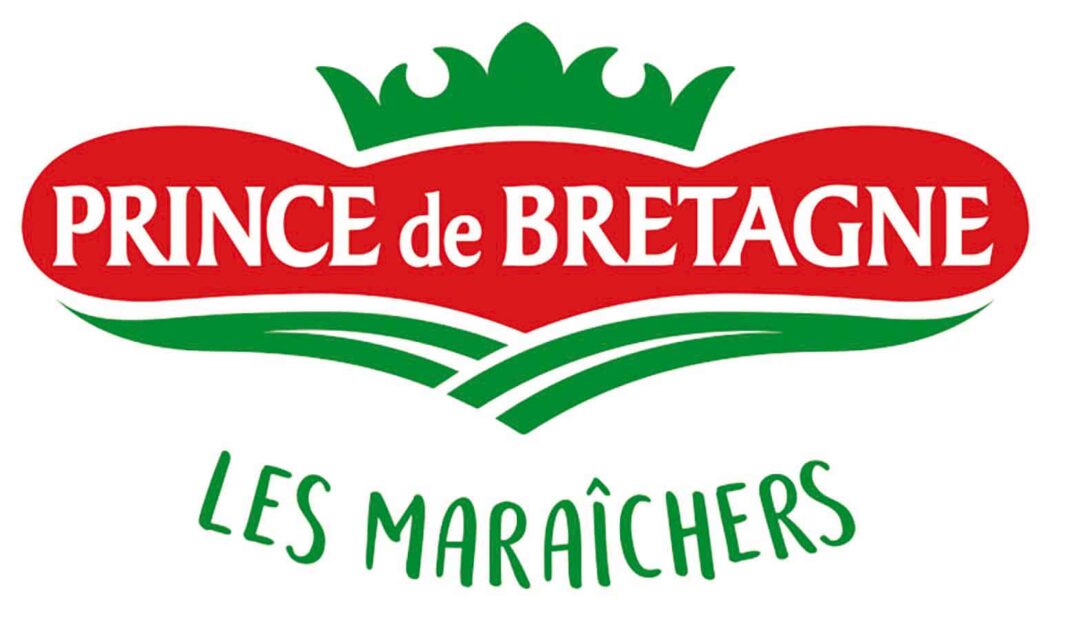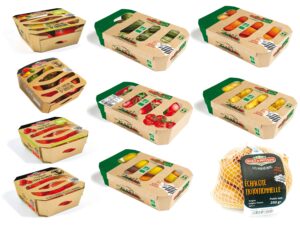The ecological transition is among the commitments made by Prince de Bretagne market gardeners, presented at the start of 2021. In terms of packaging, they have already saved 120 tonnes of plastic in 2020, adopting certified cardboard packaging and favoring wood from Breton plantations.
This year, new packaging is available in the tomato ranges, alliums and organic and new work is underway to permanently eliminate plastic from all packaging. Prince de Bretagne markets more than 80% of its production in bulk. For hygiene reasons, of transport, quality and conservation, certain products cannot avoid the use of packaging. Nevertheless, thanks to the rationalization of packaging, Prince de Bretagne reduced its packaging consumption by 1,000 tonnes in 2020. The first changes from plastic trays to cardboard trays (with film) saved 120 tonnes of plastic compared to the previous year, reducing the weight of plastic on all packaging to less than 1%. This year, the replacement of plastic film with 100% cardboard trays for certain references of organic tomatoes and vegetables, as well as the new cellulose net with its paper label for traditional shallots, are added to the “0 plastic” approach. For the Paimpol coconut and early potatoes, studies are underway on different plastic-free packaging. New 100% cardboard packaging for old vegetables (conventional and organic) should also see the light of day in 2022.
New eco-designed packaging
A pioneer in cardboard packaging with organic tomatoes for years, the tray of heirloom tomatoes and elongated cherry tomatoes is now made from 100% recyclable cardboard. These two products are also available in Grown Without Pesticides. This new packaging should save 9,6 tonnes of plastic for the 750 g tray and 6,6 tons for the 250 g package (the volume of plastic film saved is calculated based on 2020 sales). In the organic range, zucchini, carrots, colored carrots, tomatoes and early potatoes choose, they too, for all-cardboard packaging. This openwork packaging allows consumers to control the quality and freshness of fruits and vegetables. The trays were tested on more than 100 consumers before being put on the market. Finally, the net and the plastic label of traditional shallots will gradually disappear from the last quarter of 2021, for the benefit of a cellulose net accompanied by a compostable paper label.
Sustainable cardboard packaging
All cardboard packaging is FSC certified and wooden packaging PEFC (wood from responsibly managed forests). Prince de Bretagne also favors poplar wood from Breton plantations. “Our vegetables have always been mainly marketed in large packaging in locally sourced and processed wood., cardboard or reusable plastic. In 2018, we created a working group to optimize the reduction, the recyclability and reuse of our packaging. Today, the AGEC law gives us the opportunity to go further by banning all plastic in vegetable packaging below 1,5 kg. This poses some technical challenges for us, but the internal teams working with our market gardeners have already found solutions and promising avenues” declares Marie-Amélie Lacroix, sustainable development project manager at Prince de Bretagne.
End of plastic packaging for fruits and vegetables
Following the law relating to the fight against waste and the circular economy of February 2020, known as the AGEC law, a decree published in October bans plastic packaging of a certain number of unprocessed fresh fruits and vegetables from January 1, 2022. However, provisional exceptions are planned until 2026 to allow sectors to adapt.
Fruits and vegetables are often sold in small quantities in plastic packaging.. Although practical, this type of packaging will be prohibited from January 1, 2022, with temporary exceptions. The ban coming into force on January 1, 2022 concerns leeks, zucchini, eggplants, peppers, cucumbers, potatoes and carrots, round tomatoes, onions and turnips, the cabbages, cauliflowers, squash, parsnips, radishes, root vegetables, Jerusalem artichokes. Fruit side : apples, pears, bananas, oranges, clementines, the kiwis, tangerines, lemons, grapefruits, plums, melons, pineapples, mangoes, passion fruit, persimmons. A first exception is granted to fruits and vegetables sold in batches of 1,5 kg or more. Fruit and vegetables “presenting a risk of deterioration when sold in bulk” are also exempt from the ban. (raspberries, strawberries, currants, blueberries, etc.), as well as “perfectly ripe fruits”, sprouted seeds, or even “early” vegetables, that is to say harvested before their full maturity. For these three categories, the exception runs until June 30, 2026 to allow an alternative solution to be found. Except for salads, spinach, endives, asparagus and mushrooms for which the exception period is reduced to December 31, 2024. it is even shorter for ribbed tomatoes, peaches and nectarines : June 30, 2023. A tolerance period of six months for the sale of packaging stocks is also planned.. Actors “can contact Ademe in order to benefit from support in the deployment of these alternative solutions” specifies the press release from the Ministry of Ecological Transition announcing this measure.. It also remains to be seen what happens to tropical fruits and vegetables., on sale in Reunion and other overseas departments, not appearing on the current list of the Ministry of Ecological Transition. To be continued…
A billion pieces of plastic packaging eliminated
It is obviously the desire to reduce the use of plastic that motivates this decision.. Nationally, 37% of fruits and vegetables are today sold in packaging. The ban would eliminate more than a billion plastic packaging each year. It also meets one of the objectives of the climate and resilience law., born from the Citizens’ Climate Convention, which provides that commercial spaces of more than 400 m² will have to reserve at least 20% of their surface area for bulk sales by 2023.














